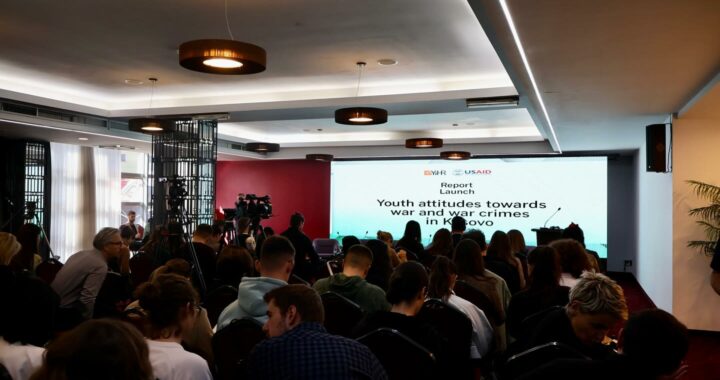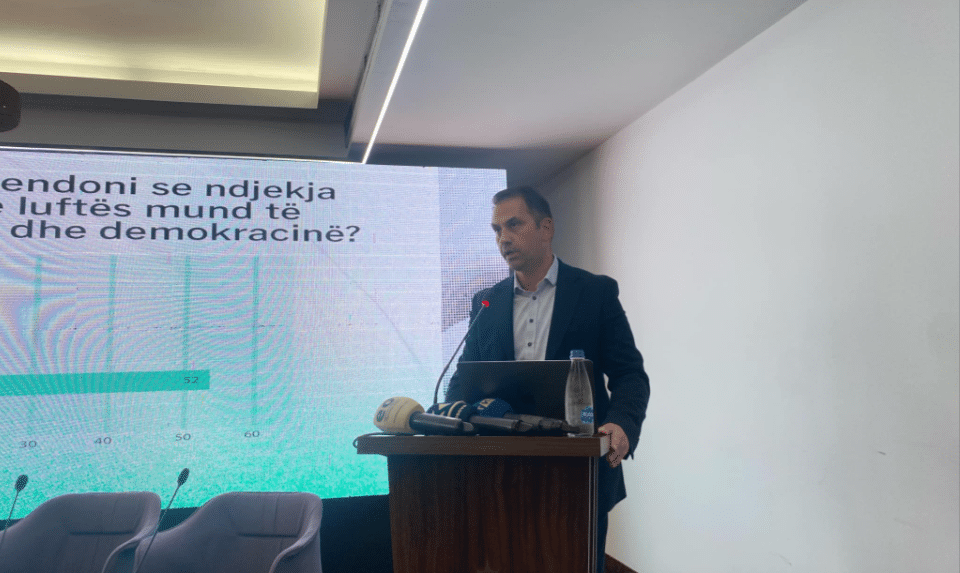

 Survey presentation by the NGO Youth Initiative for Human Rights (YIHR) on the stance of youth towards war crimes, held in Prishtina on October 22. Photo: YIHR
Survey presentation by the NGO Youth Initiative for Human Rights (YIHR) on the stance of youth towards war crimes, held in Prishtina on October 22. Photo: YIHR
New report by the Youth Initiative for Human Rights concludes that memories of a war they dont actually remember have a significant impact on the attitudes of the young, reinforcing biased narratives and ethnic division.
A survey published on Tuesday by the NGO Youth Initiative for Human Rights, YIHR, in Prishtine/Pristina concluded that although the vast majority of country’s youth have no memory of the late-1990s war, “second-hand memories” of it still affect their attitudes toward the events of a quarter-century ago.
The survey highlights differences in responses between Kosovo Albanian and Kosovo Serb youth to the war, the prosecution of war crimes and the role of the young in reconciliation and peace agreements.
The study, “Youth attitudes towards war and war crimes in Kosovo”, focuses on the impact of the war’s memory in Kosovo, examining its influence on political, regional and gender perspectives across different ethnic groups and social categories.
It explores how these attitudes vary, based on factors such as age, gender, socioeconomic status, ethnicity, settlement type and regional affiliation.
“The report shows that the war’s heritage still affects younger generations, those who have not experienced the war but carry its burden through what we call ‘second hand memory’,” Marigona Shabiu, Director of the YIHR Office in Kosovo, said.
“This study provides a deep analysis on the way how Kosovo youth see war crimes, interethnic relations and the role of justice,” she added.
Bekim Baliqi, a Pristina University professor and author of the report, said respondents to the study included young people aged 18-30 from all of Kosovo’s communities.

“The majority of youth consider that they have general information about the past, and this was important fur us…. But as you can see, the majority of them are informed by their families and the family environment but also by online sources including media,” Baliqi said.
The report says contradictory views of the war and on war memory have diverse impacts on society, and “can lead to divisions among ethnic groups and victimization”.
“It can also present challenges to efforts for democratisation, reconciliation and to improving inter-ethnic relations. Younger generations are particularly affected by biased narratives of war and war crimes, which they encounter through various means such as narratives, memorials, social media and history textbooks,” the report notes.
It also says that those born in Kosovo in the late-1990s and early 2000s are especially influenced by the war in different ways and their perspectives are shaped not only by public memorialization and narratives but also by family experiences and memories.
“These narratives of past violent events have a dual effect on younger generations: they reinforce ethnic sentiments and political attitudes and provoke distrust towards other ethnic groups. As a result, it becomes very challenging to appropriately address mass atrocities and war crimes, as well as to achieve transitional justice, reconciliation, and peacebuilding,” the report says.
The survey recommends Kosovo authorities to develop a comprehensive strategy for the politics of memory, focusing on war-related events and experiences, and incorporate more inclusive and fact-based educational programmes in schools and universities to ensure students gain a better understanding of the war.
22 October 2024 - 17:11

In Kosovo’s public discourse, early pregnancies are frequently portr...

A significant portion of the information consumed by the citizens of K...

Former intelligence agency chief Driton Gashi was sentenced to four ye...

Kosovo has emerged as a critical transit point along the Balkan route,...